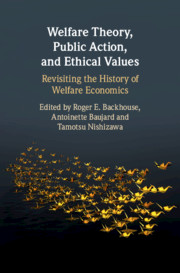155 results
Peter Clarke. Keynes in Action: Truth and Expediency in Public Policy. Cambridge: Cambridge University Press, 2022. Pp. 274. $39.99 (cloth).
-
- Journal:
- Journal of British Studies / Volume 62 / Issue 4 / October 2023
- Published online by Cambridge University Press:
- 19 February 2024, pp. 1086-1088
- Print publication:
- October 2023
-
- Article
- Export citation
8 - Individualism and Ethics
- from Part II - Developing Modern Welfare Economics
-
-
- Book:
- Welfare Theory, Public Action, and Ethical Values
- Published online:
- 04 March 2021
- Print publication:
- 25 March 2021, pp 186-207
-
- Chapter
- Export citation
Contributors
-
- Book:
- Welfare Theory, Public Action, and Ethical Values
- Published online:
- 04 March 2021
- Print publication:
- 25 March 2021, pp viii-viii
-
- Chapter
- Export citation
Figures and Tables
-
- Book:
- Welfare Theory, Public Action, and Ethical Values
- Published online:
- 04 March 2021
- Print publication:
- 25 March 2021, pp vii-vii
-
- Chapter
- Export citation
14 - Conclusion
- from Part II - Developing Modern Welfare Economics
-
-
- Book:
- Welfare Theory, Public Action, and Ethical Values
- Published online:
- 04 March 2021
- Print publication:
- 25 March 2021, pp 320-331
-
- Chapter
- Export citation
Acknowledgements
-
- Book:
- Welfare Theory, Public Action, and Ethical Values
- Published online:
- 04 March 2021
- Print publication:
- 25 March 2021, pp ix-x
-
- Chapter
- Export citation
Index
-
- Book:
- Welfare Theory, Public Action, and Ethical Values
- Published online:
- 04 March 2021
- Print publication:
- 25 March 2021, pp 332-338
-
- Chapter
- Export citation
Part I - Plurality of Welfare in the Making of Welfare Economics
-
- Book:
- Welfare Theory, Public Action, and Ethical Values
- Published online:
- 04 March 2021
- Print publication:
- 25 March 2021, pp 19-156
-
- Chapter
- Export citation
Contents
-
- Book:
- Welfare Theory, Public Action, and Ethical Values
- Published online:
- 04 March 2021
- Print publication:
- 25 March 2021, pp v-vi
-
- Chapter
- Export citation
Copyright page
-
- Book:
- Welfare Theory, Public Action, and Ethical Values
- Published online:
- 04 March 2021
- Print publication:
- 25 March 2021, pp iv-iv
-
- Chapter
- Export citation
Part II - Developing Modern Welfare Economics
-
- Book:
- Welfare Theory, Public Action, and Ethical Values
- Published online:
- 04 March 2021
- Print publication:
- 25 March 2021, pp 157-331
-
- Chapter
- Export citation
Introduction: Revisiting the History of Welfare Economics
-
-
- Book:
- Welfare Theory, Public Action, and Ethical Values
- Published online:
- 04 March 2021
- Print publication:
- 25 March 2021, pp 1-18
-
- Chapter
- Export citation

Welfare Theory, Public Action, and Ethical Values
- Revisiting the History of Welfare Economics
-
- Published online:
- 04 March 2021
- Print publication:
- 25 March 2021
David Colander and Craig Freedman Where Economics Went Wrong: Chicago’s Abandonment of Classical Liberalism (Princeton and Oxford: Princeton University Press, 2019), pp. 267, $27.95 (hardcover). ISBN: 9780691179209.
-
- Journal:
- Journal of the History of Economic Thought / Volume 42 / Issue 1 / March 2020
- Published online by Cambridge University Press:
- 27 January 2020, pp. 149-152
- Print publication:
- March 2020
-
- Article
- Export citation
Gerald R. Steele, The Economic Thought of Henry Calvert Simons: Crown Prince of the Chicago School (London and New York: Routledge), pp. xiv + 192, $116 (hardcover). ISBN: 9780815364658.
-
- Journal:
- Journal of the History of Economic Thought / Volume 41 / Issue 4 / December 2019
- Published online by Cambridge University Press:
- 02 September 2019, pp. 645-647
- Print publication:
- December 2019
-
- Article
- Export citation
Craig Freedman, In Search of the Two-Handed Economist: Ideology, Methodology and Marketing in Economics (London: Palgrave Macmillan, 2016), pp. xx + 418, $159.99 (hardcover). ISBN: 9781137589736.
-
- Journal:
- Journal of the History of Economic Thought / Volume 41 / Issue 1 / March 2019
- Published online by Cambridge University Press:
- 07 February 2019, pp. 129-130
- Print publication:
- March 2019
-
- Article
- Export citation
Michel De Vroey, A History of Macroeconomics: From Keynes to Lucas and Beyond (Cambridge: Cambridge University Press, 2016), pp. xix + 445, $49.99 (paperback). ISBN: 9781107584945.
-
- Journal:
- Journal of the History of Economic Thought / Volume 40 / Issue 1 / March 2018
- Published online by Cambridge University Press:
- 30 January 2018, pp. 135-137
- Print publication:
- March 2018
-
- Article
- Export citation
Introduction
-
- Book:
- The History of Economics
- Published by:
- Agenda Publishing
- Published online:
- 09 August 2023
- Print publication:
- 30 November 2017, pp vii-xii
-
- Chapter
- Export citation
Lecture 11 - From Political Economy to Economics
-
- Book:
- The History of Economics
- Published by:
- Agenda Publishing
- Published online:
- 09 August 2023
- Print publication:
- 30 November 2017, pp 169-184
-
- Chapter
- Export citation
Index
-
- Book:
- The History of Economics
- Published by:
- Agenda Publishing
- Published online:
- 09 August 2023
- Print publication:
- 30 November 2017, pp 373-386
-
- Chapter
- Export citation



